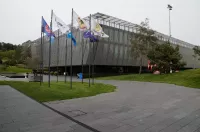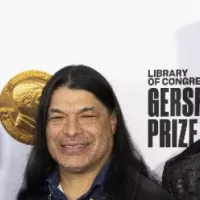Germany, officially the Federal Republic of Germany, is a nation in Western and Central Europe, bordered by nine countries and featuring coastlines on the Baltic and North Seas, as well as the Alps in the south. With over 82 million residents across sixteen states, it is the most populous member of the European Union. Berlin is the capital and largest city, while Frankfurt serves as its financial hub. The Ruhr area represents its largest urban concentration.
1904: Genocide in South West Africa
In 1904, the colonial government in German South West Africa (present-day Namibia) began the annihilation of the Herero and Nama peoples as punishment for an uprising; this was the 20th century's first genocide.
1908: End of Genocide in South West Africa
In 1908, the colonial government in German South West Africa ended the annihilation of the Herero and Nama peoples which started in 1904.
1912: Babelsberg Studio Established
In 1912, the renowned Babelsberg Studio in Potsdam was established, thus being the first large-scale film studio in the world.
November 1918: German Revolution
In November 1918, during the German Revolution, Wilhelm II and the ruling princes abdicated their positions, and Germany was declared a federal republic.
August 1919: Weimar Constitution Signed
On August 11, 1919, President Friedrich Ebert signed the democratic Weimar Constitution.
1919: Treaty of Versailles
In 1919, Germany's new leadership signed the Treaty of Versailles, accepting defeat by the Allies. The treaty was perceived as humiliating by Germans and is seen by historians as influential in the rise of Adolf Hitler.
1920: Kapp Putsch
In 1920, conservative elements failed to overthrow the central government in the Kapp Putsch.
1924: Stabilization of Government
In 1924, a plan to restructure Germany's war reparations and the creation of a new currency helped stabilize the government and ushered in the Golden Twenties.
1927: Metropolis Released
Director Fritz Lang's Metropolis was released in 1927 and is referred to as the first major science-fiction film.
1929: Great Depression Hits Germany
In 1929, the worldwide Great Depression hit Germany.
July 1932: Nazi Party Largest in Reichstag
Following the election of July 1932, the Nazi Party, led by Adolf Hitler, became the largest party in the Reichstag.
January 1933: Hitler Appointed Chancellor
On January 30, 1933, President Hindenburg appointed Adolf Hitler chancellor of Germany.
March 1933: Enabling Act
On March 23, 1933, the Enabling Act gave Hitler unrestricted legislative power, overriding the constitution, and marking the beginning of Nazi Germany.
1933: Nazi Rise to Power
In 1933, the Nazi Party rose to power in Germany, leading to the establishment of a totalitarian dictatorship, World War II, and the Holocaust.
1935: Nuremberg Laws Introduced
In 1935, the regime withdrew from the Treaty of Versailles and introduced the Nuremberg Laws which targeted Jews and other minorities. Germany also reacquired control of the Saarland in 1935.
1936: Olympic Games in Berlin and Garmisch-Partenkirchen
In 1936, Berlin hosted the Summer Games and the Winter Games in Garmisch-Partenkirchen.
1936: Remilitarization of the Rhineland
In 1936, Germany remilitarized the Rhineland.
March 1939: Occupation of Czechoslovakia
In March 1939, Germany occupied Czechoslovakia in violation of the Munich Agreement.
August 1939: Molotov-Ribbentrop Pact
In August 1939, Hitler's government negotiated the Molotov–Ribbentrop Pact, dividing Eastern Europe into German and Soviet spheres of influence.
1940: Conquest of Denmark, Norway, Netherlands, Belgium, Luxembourg, and France
In the spring of 1940, Germany conquered Denmark and Norway, the Netherlands, Belgium, Luxembourg, and France, forcing the French government to sign an armistice. The British repelled German air attacks in the Battle of Britain in the same year.
1941: Invasion of Yugoslavia, Greece, and the Soviet Union
In 1941, German troops invaded Yugoslavia, Greece, and the Soviet Union, and Germany declared war on the United States.
1942: Control of Continental Europe and North Africa
By 1942, Germany and its allies controlled most of continental Europe and North Africa.
1944: Soviets and Western Allies Advance
In 1944, the Soviets pushed into Eastern Europe; the Western allies landed in France and entered Germany despite a final German counteroffensive.
May 1945: Germany Surrenders
In May 8 1945, Following Hitler's suicide during the Battle of Berlin, Germany signed the surrender document, ending World War II in Europe and Nazi Germany.
1945: Trümmerfilm Era
After 1945, many of the films of the immediate post-war period can be characterised as Trümmerfilm (rubble film).
1948: Marshall Plan Aid
In 1948, West Germany became a major recipient of reconstruction aid under the American Marshall Plan.
May 1949: Formation of the Federal Republic of Germany (FRG)
On May 23, 1949, the western sectors of Germany controlled by France, the United Kingdom, and the United States, were merged to form the Federal Republic of Germany (FRG), also known as West Germany.
October 1949: Formation of the German Democratic Republic (GDR)
On October 7, 1949, the Soviet Zone of Germany became the German Democratic Republic (GDR), also known as East Germany.
1949: Konrad Adenauer Elected Chancellor
In 1949, Konrad Adenauer was elected the first federal chancellor of Germany.
1949: Division of Germany
In 1949, after World War II and Allied occupation, Germany was divided into two separate political entities: the Federal Republic of Germany (FRG), or West Germany, and the German Democratic Republic (GDR), or East Germany.
1949: Party system dominated by CDU and SPD
In 1949, the Christian Democratic Union (CDU) and the Social Democratic Party of Germany (SPD) became the dominant forces in the German party system.
1949: Grundgesetz (Basic Law)
The German political system operates under a framework laid out in the 1949 constitution known as the Grundgesetz (Basic Law).
1951: Berlin International Film Festival
Since 1951, the Berlin International Film Festival known as "Berlinale", awarding the "Golden Bear" is held annually.
January 1957: Saarland Joins West Germany
On January 1, 1957, the Saarland joined West Germany.
1961: Construction of the Berlin Wall
In 1961, the Berlin Wall was built, preventing East German citizens from escaping to West Germany and becoming a symbol of the Cold War.
1979: The Tin Drum Wins Oscar
In 1979, the Academy Award for Best Foreign Language Film (Oscar) went to the German production "The Tin Drum" (Die Blechtrommel).
1989: Fall of the Iron Curtain
In 1989, Hungary decided to dismantle the Iron Curtain and open its border with Austria, causing the emigration of thousands of East Germans to West Germany via Hungary and Austria.
October 1990: German Reunification
In October 1990, after the fall of the communist government in East Germany, German reunification occurred, with the former East German states joining the Federal Republic of Germany.
1990: Reduced primary energy consumption by 11%
Germany has reduced its primary energy consumption by 11% between 1990 and 2015.
1990: German Unity Day
Since 1990, 3 October has been a national day of Germany, celebrated as the Tag der Deutschen Einheit (German Unity Day).
1990: Strong alliance with France and neighbouring countries
Since 1990, Germany has maintained a strong alliance with France and all neighboring countries.
1992: Signing of the Maastricht Treaty
In 1992, Germany signed the Maastricht Treaty.
1994: Court defines "defence"
After a ruling of the Federal Constitutional Court in 1994, the term "defence" has been defined not only to include protection of the borders of Germany, but also crisis reaction and conflict prevention, or more broadly as guarding the security of Germany anywhere in the world.
1994: Berlin/Bonn Act
Based on the Berlin/Bonn Act of 1994, Berlin became the capital of Germany again.
1999: Relocation of Government Completed
In 1999, the relocation of the German government was completed.
2001: Women allowed in all military roles
Since 2001, women may serve in all functions of service without restriction in the German military.
2002: Germany introduces the euro
Germany introduced the common EU currency, the euro, in 2002.
2002: Nowhere in Africa Wins Oscar
In 2002, the Academy Award for Best Foreign Language Film (Oscar) went to the German production "Nowhere in Africa" (Nirgendwo in Afrika).
2005: Angela Merkel Becomes Chancellor
In 2005, Angela Merkel became the first female chancellor of Germany.
2005: Germany ranks fourth in R&D expenditure
Since 2005, Germany has ranked fourth in research and development expenditure.
2007: Signing of the Lisbon Treaty
In 2007, Germany signed the Lisbon Treaty.
2007: The Lives of Others Wins Oscar
In 2007, the Academy Award for Best Foreign Language Film (Oscar) went to the German production "The Lives of Others" (Das Leben der Anderen).
2007: The Left becomes a staple in the German Bundestag
Since 2007, the democratic socialist party, The Left, has been a consistent presence in the German Bundestag.
2009: Stimulus Plan Approved
In 2009, the German government approved a €50 billion stimulus plan.
2011: Jewish community in Germany
In 2011, formal members of the Jewish community represented no more than 0.2% of the total German population, and 60% of them resided in Berlin.
2011: Islam in Germany
In the 2011 census, 1.9% of respondents (1.52 million people) gave their religion as Islam.
2011: Military service suspended
Until 2011, military service was compulsory for men at age 18, but this has been officially suspended and replaced with a voluntary service.
2012: TV Households in Germany
As of 2012, Germany's television market is the largest in Europe, with over 38 million TV households.
2013: Music Market Size
In 2013, Germany was the second-largest music market in Europe, and fourth-largest in the world.
2013: Beer Consumption Per Capita
In 2013, Germany's beer consumption per capita stood at 110 litres and remains among the highest in the world.
2013: Germany's Positive Influence
In 2013, global opinion polls from the BBC revealed that Germany is recognised for having the most positive influence in the world.
2013: WHO Report on Healthcare
In 2013, the World Health Organization (WHO) reported that Germany's health care system was 77% government-funded and 23% privately funded.
2014: Obesity Study
A 2014 study showed that 52 percent of the adult German population was overweight or obese.
2014: Healthcare Spending
In 2014, Germany spent 11.3% of its GDP on health care.
2014: Germany's Positive Influence
In 2014, global opinion polls from the BBC revealed that Germany is recognised for having the most positive influence in the world.
2014: FIFA World Cup Victory
The German men's national football team won the FIFA World Cup in 2014.
2015: European Migrant Crisis
During the 2015 European migrant crisis, Germany took in over a million refugees and migrants.
2015: Reduced primary energy consumption by 11%
Germany has reduced its primary energy consumption by 11% between 1990 and 2015.
2015: Germany host to second-highest number of international migrants
In 2015, Germany was listed as host to the second-highest number of international migrants worldwide, about 5% or 12 million of all 244 million migrants.
2015: Contribution of travel and tourism to GDP
In 2015, domestic and international travel and tourism directly contributed over €105.3 billion to German GDP and supported nearly 4.2 million jobs.
2016: Land Use
As of 2016, 51% of Germany's land area is devoted to agriculture, while 30% is forested and 14% is covered by settlements or infrastructure.
2016: Germany's murder rate at a low
In 2016, Germany's murder rate reached a low of 1.18 murders per 100,000 people.
2017: Germany divided into 401 districts
As of 2017, Germany is divided into 401 districts (Kreise) at a municipal level, consisting of 294 rural districts and 107 urban districts.
2017: High household recycling rate
As of 2017, Germany's household recycling rate is among the highest in the world, at around 65%.
2017: Troops stationed in foreign countries
As of 2017, the German military has about 3,600 troops stationed in foreign countries as part of international peacekeeping forces.
2017: Germany accounts for 28% of Eurozone Economy
In 2017, Germany accounted for 28% of the eurozone economy, according to the International Monetary Fund.
2017: Frank-Walter Steinmeier as President
Since 2017, Frank-Walter Steinmeier is the head of state.
2017: Same-sex marriage legalized
Since 2017, same-sex marriage has been legal in Germany, and LGBT rights are generally protected.
2017: AfD enters the German Bundestag
Since 2017, the right-wing populist party Alternative for Germany (AfD) has been a staple in the German Bundestag.
2018: Renewable sources
In 2018, Germany meets its power demands using 40% renewable sources.
2018: Germany ranked fourth globally in science and engineering research papers published
In 2018, Germany ranked fourth globally in terms of number of science and engineering research papers published.
2018: Overall crime rate falls to lowest since 1992
In 2018, the overall crime rate in Germany fell to its lowest level since 1992.
2018: Michelin Guide Awards
The 2018 Michelin Guide awarded eleven restaurants in Germany three stars, giving the country a cumulative total of 300 stars.
February 2019: Average Monthly Precipitation
In February 2019, average monthly precipitation was 30 litres per square metre in Germany.
April 2019: Average Monthly Precipitation
In April 2019, average monthly precipitation was 30 litres per square metre in Germany.
June 2019: Average Monthly Temperatures and Sunshine
In June 2019, average monthly temperatures ranged to a high of 19.8 °C (67.6 °F) and average monthly hours of sunshine ranged to 300 in Germany.
November 2019: Average Monthly Hours of Sunshine
In November 2019, average monthly hours of sunshine ranged from 45 in Germany.
2019: Life Expectancy and Cause of Death
In 2019, Germany ranked 21st in the world in life expectancy with 78.7 years for men and 84.8 years for women. The principal cause of death was cardiovascular disease, at 37%.
2019: Percentage of migrants
In 2019, Germany ranked seventh among EU countries in terms of the percentage of migrants in the country's population, at 13.1%.
2019: Wine Production
In 2019, Germany was the ninth-largest wine producer in the world.
2019: Germany second-biggest aid donor
In 2019, Germany was the world's second-biggest aid donor, following the United States.
2019: Seventh-largest energy consumer
In 2019, Germany was the world's seventh-largest consumer of energy.
2019: Scheduled End of East German Economy Modernization
In 2019, the modernisation of the East German economy was scheduled to last until this year.
2019: Estimated number of Muslims
In 2019, there were an estimated 5.3–5.6 million Muslims with a migrant background (6.4–6.7% of the population), in addition to an unknown number of Muslims without a migrant background.
January 2020: Average Monthly Temperatures
In January 2020, average monthly temperatures were ranged from a low of 3.3 °C (37.9 °F) in Germany.
January 2020: Unemployment rate at 3.2%
As of January 2020, the unemployment rate published by Eurostat in Germany was 3.2%, which is the fourth-lowest in the EU.
February 2020: Average Monthly Precipitation
In February 2020, average monthly precipitation was 125 litres per square metre in Germany.
2020: Germany fifth-largest arms exporter
According to the Stockholm International Peace Research Institute, from 2020 to 2024 Germany was the fifth-largest exporter of major arms in the world.
2021: German military budget
In 2021, the German military budget was 53 billion euros.
2022: Christianity largest religion
According to the 2022 census, Christianity is the largest religion in Germany at 49.7% of the population.
2022: People with a migration background
In 2022, there were 23.8 million people—28.7 percent of the total population—who had a migration background.
2022: Fertility rate
The fertility rate of 1.57 children born per woman (2022 estimates) is below the replacement rate of 2.1 and is one of the lowest in the world.
April 2023: Ukrainian refugees in Germany
As of April 2023, over 1.06 million refugees from Ukraine were recorded in Germany, following the 2022 Russian invasion of Ukraine.
2023: Majority of population no longer Christian
A study in 2023 estimated that 46.2% of the population are not members of any religious organisation or denomination and that a majority of the population no longer belongs to a Christian denomination (48.5% Christians).
2023: Nuclear power plants phased out
All German nuclear power plants were phased out in 2023.
2023: Sector contributions to GDP
As of 2023, Germany's service sector contributes approximately 72% of the total GDP, the industrial sector 27%, and the agricultural sector 1%.
2023: Military spending below NATO target
In 2023, German military spending according to NATO criteria amounted to $73.1 billion, or 1.64% of the country's GDP, well below the NATO target of 2%.
2023: 14th highest emitting nation of greenhouse gases
In 2023, Germany was the 14th highest emitting nation of greenhouse gases.
2023: Third in the quality-adjusted Nature Index
In 2023, Germany was third in the quality-adjusted Nature Index.
2023: Automotive industry ranking
In 2023, the German automotive industry was the sixth-largest by production and largest by export value.
2023: German census population
With a population of 84.7 million according to the 2023 German census, Germany is the most populous member state of the European Union.
May 2024: Bundeswehr strength
As of May 2024, the Bundeswehr has a strength of 180,215 active soldiers and 80,761 civilians.
2024: Germany seventh-most-visited country
As of 2024, Germany is the seventh-most-visited country.
2024: PPP-adjusted GDP per capita
Germany's PPP-adjusted GDP per capita amounted to 115% of the EU average in 2024.
2024: Largest trading partners
In 2024, Germany's largest trading partners were the United States, China, and the Netherlands.
2024: Violent crime reaches a 15-year high
In 2024, violent crime in Germany reached a 15-year high, with overall crime also rising.
2024: German military spending fourth-highest in the world
In absolute terms, German military spending in 2024 was the fourth-highest in the world. In 2024, Germany reported $97.7 billion to NATO, exceeding said target at 2.12% of GDP.
2024: Fortune Global 500 companies based in Germany
Of the world's 500 largest stock market-listed companies by revenue in 2024, the Fortune Global 500, 29 were based in Germany.
2024: Prominent German Companies
Prominent German companies include Mercedes-Benz, BMW, Volkswagen, Audi, Porsche, Siemens, Adidas, SAP, Bosch and BASF.
2025: UNESCO World Heritage List
As of 2025, UNESCO inscribed 55 properties in Germany on the World Heritage List.
2025: Germany ranked 11th in the Global Innovation Index
In 2025, Germany was ranked 11th in the Global Innovation Index.
2025: Friedrich Merz as chancellor
Since 2025, Friedrich Merz is the head of government.
2030: Energy Consumption Reduction Goal
Germany has set itself goals of reducing its primary energy consumption by 30% until 2030
2050: Energy Consumption Reduction Goal
Germany has set itself goals of reducing its primary energy consumption by 50% until 2050.
Mentioned in this timeline
Ukraine is a country in Eastern Europe the second-largest on...

The stock market is where buyers and sellers trade stocks...
The Union of Soviet Socialist Republics USSR existed from to...
Africa is the second-largest and second-most populous continent comprising of...

Football is a family of team sports primarily involving kicking...

FIFA the F d ration Internationale de Football Association is...
Trending

6 minutes ago Metallica Announces Sphere Las Vegas Residency: 'Life Burns Faster' Concert Series in 2026

1 hour ago Priyanka Chopra Jonas stars in 'The Bluff,' a gritty pirate action movie.

1 hour ago Lupita Nyong'o Shares Fibroid Struggle, Advocates for Women's Health in New Campaign

3 hours ago Souvenir Shop Manager Reflects on Final Groundhog Day with Punxsutawney Phil

3 hours ago Mike Tirico's Inspiring Olympic Sign-Off: A Look at His Legacy in Sports Broadcasting.

3 hours ago Benny Blanco's Dirty Feet Video Sparks Internet Outrage and Divorce Suggestions for Selena Gomez.
Popular

Jesse Jackson is an American civil rights activist politician and...

Susan Rice is an American diplomat and public official prominent...

Barack Obama the th U S President - was the...

Michael Joseph Jackson the King of Pop was a highly...

XXXTentacion born Jahseh Dwayne Ricardo Onfroy was a controversial yet...

Bernie Sanders is a prominent American politician currently serving as...